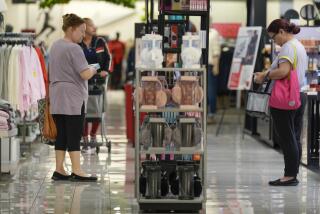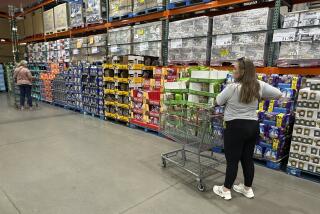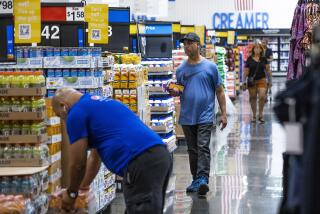Consumer Spending Slows Despite Jump in Incomes
WASHINGTON — Consumer spending just about flat-lined in July, with the smallest rise in nine months, even as the first tax-rebate checks put more money in shoppers’ pockets.
Still, economists were hopeful that consumers, whose spending accounts for two-thirds of the nation’s economic activity, would be less tightfisted in coming months and continue to keep the economy afloat.
Consumers increased spending by just 0.1% in July after ratcheting up spending the month before by a robust 0.5%, the Commerce Department reported Thursday. Spending growth in July was the slowest since October.
At the same time, Americans’ incomes, which include wages, interest and government benefits, posted the largest gain of the year, 0.5%. They grew by 0.4% in June.
Disposable incomes--the amount left after taxes--soared by 1.7% in July, compared with a 0.3% increase the month before. July’s gain was the biggest since December 1993.
The spending and income figures are not adjusted for inflation.
Disposable incomes were bolstered by the tax rebates, the first wave of which was mailed out July 20, and a one-time increase in Social Security payments to correct earlier underpayments.
Excluding these factors, the government said disposable income would have increased 0.3% in July, the same as in June.
“Even excluding tax rebates, income gains remain strong, and that should help sustain consumer spending and keep the economy going,” said economist Joel Naroff of Naroff Economic Advisors.
With income growth outpacing spending, the nation’s personal savings rate--savings as a percentage of after-tax income--rose to 2.5% in July, the highest since June 1999.
Some economists say consumers’ lackluster spending in July reflected worries about keeping jobs in the face of mounting layoffs.
A report from the Labor Department on Thursday showed new claims for state unemployment insurance fell by 1,000 last week to 399,000. But the four-week moving average of claims, which smooths out weekly fluctuations, rose by 12,500 to 393,000, suggesting the labor market remains weak.
In another report, the Commerce Department said sales at online retailers fell in the second quarter from the previous quarter even as overall retail sales jumped 10.8%.
Online purchases fell 1.8% to $7.46 billion, after sinking 14.5% in the first quarter, but were up 24.7% from the 2000 second quarter. As a percentage of total retail sales, online purchases from U.S. businesses fell to 0.92% in the second quarter from 1.04% in the first quarter.
More to Read
Inside the business of entertainment
The Wide Shot brings you news, analysis and insights on everything from streaming wars to production — and what it all means for the future.
You may occasionally receive promotional content from the Los Angeles Times.










